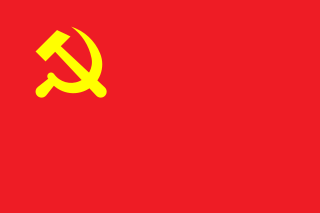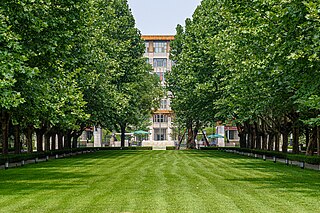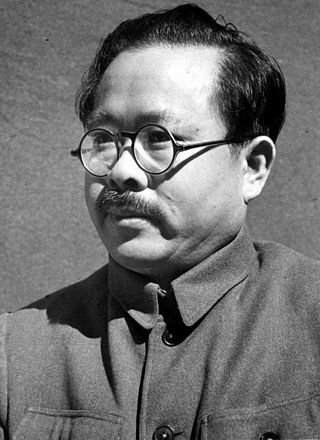Related Research Articles

The Chinese Communist Party (CCP), officially the Communist Party of China (CPC), is the founding and sole ruling party of the People's Republic of China (PRC). Under the leadership of Mao Zedong, the CCP emerged victorious in the Chinese Civil War against the Kuomintang. In 1949, Mao proclaimed the establishment of the People's Republic of China. Since then, the CCP has governed China and has sole control over the People's Liberation Army (PLA). Each successive leader of the CCP has added their own theories to the party's constitution, which outlines the ideology of the party, collectively referred to as socialism with Chinese characteristics. As of 2023, the CCP has more than 98 million members, making it the second largest political party by membership in the world after India's Bharatiya Janata Party.

The premier of the State Council of the People's Republic of China, commonly called the premier of China, is the head of government of China and leader of the State Council. The premier is the second-highest ranking person in China's political system, under the general secretary of the Chinese Communist Party/president of China, and holds the highest rank in the civil service of the central government.
The orders of precedence in China is the ranking of political leaders in China for the purposes of event protocol and to arrange the ordering of names in official news bulletins, both written and televised. It is also sometimes used to assess perceived level of political power. Although there is no formally published ranking, there is usually an established convention and protocol, and the relative positions of Chinese political figures can usually be deduced from the order in meetings and especially by the time and order in which figures are covered by the official media. Since 1982, the General Secretary of the Chinese Communist Party has been the highest ranking official in the People's Republic of China (PRC).

The Secretariat, officially the Secretariat of the Central Committee of the Communist Party of China, is a body serving the Politburo and its Standing Committee. The secretariat is mainly responsible for carrying out routine operations of the Politburo and coordinating organizations and stakeholders to achieve tasks set out by the Politburo. It is empowered by the Politburo to make routine day-to-day decisions on issues of concern in accordance with the decisions of the Politburo, but it must consult the Politburo on substantive matters. The de facto head of the Secretariat is the first-ranked secretary.

The Chairman of the Central Committee of the Chinese Communist Party was the leader of the Chinese Communist Party. The position was established at the 8th National Congress in 1945 and abolished at the 12th National Congress in 1982, being replaced by the general secretary. Offices with the name Chairman of the Central Executive Committee and Chairman of the Central Committee existed in 1922–1923 and 1928–1931, respectively.
Hu Qili is a former high-ranking politician of the Chinese Communist Party (CCP). He was the first-ranked secretary of the CCP Secretariat from 1985 to 1989 and a member of the CCP Politburo Standing Committee from 1987 to 1989. In 1989, he was purged for his sympathy toward the students of the 1989 Tiananmen Square protests and his support for General Secretary Zhao Ziyang. However, he was able to get back into politics in 1991. In 2001, he was named chairman of the Soong Ching-ling Foundation.

The CentralParty School of the Chinese Communist Party, officially the Party School of the Central Committee of the Communist Party of China and commonly known as the Central Party School (中央党校), is the higher education institution which trains Chinese Communist Party (CCP) cadres. It is located in Haidian District, Beijing, close to the Old Summer Palace and Summer Palace. The current president is Chen Xi, a member of the CCP Politburo.
The 10th Politburo of the Chinese Communist Party (CCP), formally the Political Bureau of the 10th Central Committee of the Communist Party of China, was elected at the 1st Plenary Session of the 10th Central Committee of the CCP on 30 August 1973 in the aftermath of the 10th National Congress. This electoral term was preceded by the 9th Politburo and succeeded by the 11th. 11 of the 22 members served concurrently in the 10th Politburo Standing Committee.
The 7th Politburo of the Chinese Communist Party (CCP), formally the Political Bureau of the 7th Central Committee of the Communist Party of China, was elected at the 1st Plenary Session of the 7th Central Committee of the CCP on 19 June 1945 in the aftermath of the 7th National Congress. This electoral term was preceded by the 6th Politburo and succeeded by the 8th. Seven of the 15 members served concurrently in the 7th Secretariat.
The 5th Politburo, formally the Political Bureau of the 5th Central Committee of the Communist Party of China, was elected by the 1st Plenary Session of the 5th Central Committee in 1927, in the aftermath of the 5th National Congress of the Chinese Communist Party (CCP). This electoral term was preceded by the 4th Central Bureau and succeeded by the 6th Politburo in 1928.
The 4th Central Bureau of the Chinese Communist Party (CCP), formally the Central Bureau of the 4th Central Executive Committee of the Communist Party of China, was elected at the 1st Plenary Session of the 4th Central Executive Committee of the CCP on 22 January 1925 in the aftermath of the 4th National Congress. This electoral term was preceded by the 3rd Central Bureau and succeeded by the 5th Politburo.
The 5th Central Committee of the Chinese Communist Party was in session from 1927 to 1928. It was set into motion by the 5th National Congress. It was followed by the 6th Central Committee of the Chinese Communist Party.
The 4th Central Executive Committee of the Chinese Communist Party was in session from 1925 to 1927, and was the last central committee to have the term 'executive' in its title. It was set into motion by the 4th National Congress of the Chinese Communist Party. This would be followed by the 5th Central Committee of the Chinese Communist Party.
The 3rd Central Executive Committee of the Chinese Communist Party was in session from 1923 to 1925, while China was a a republic. The 2nd Central Executive Committee of the Chinese Communist Party preceded it. The 4th Central Executive Committee of the Chinese Communist Party followed.

Ren Bishi was a military and political leader in the early Chinese Communist Party (CCP).
The organization of the Chinese Communist Party (CCP) is based upon the Leninist concept of democratic centralism.

The 2nd National Congress of the Chinese Communist Party was held in the Shanghai International Settlement at the apartment of Li Da of 625 Pude Lane, South Chengdu Road, between July 16 and July 23, 1922. The congress was attended by 12 representatives, representing 195 members of the Chinese Communist Party (CCP). The congress succeeded the 1st National Congress of the Chinese Communist Party and preceded the 3rd National Congress of the Chinese Communist Party.

Tan Pingshan was a Chinese revolutionary socialist and an early member of the Chinese Communist Party (CCP) from Gaoming, Guangdong. He was influential in the Tongmenghui and formed the Guangdong branch of the CCP with the help of Chen Duxiu. He later took part in the formation of the Revolutionary Committee of the Chinese Kuomintang.

The 4th National Congress of the Chinese Communist Party was held in the Shanghai International Settlement at a shikumen residence in No. 8, Lane 256, Dongbaoxing Road, between 11 and 22 January 1925. The congress was attended by 20 participants representing 994 party members of the Chinese Communist Party (CCP). The congress succeeded the 3rd National Congress of the Chinese Communist Party and preceded the 5th National Congress of the Chinese Communist Party. A congress report was drafted by Chen Duxiu who represented the 3rd Central Executive Committee of the Chinese Communist Party.

The 3rd National Congress of the Chinese Communist Party was held in Guangzhou at 31 Xuguyuan Road between June 12 and June 20, 1923. It succeeded the 2nd National Congress of the Chinese Communist Party and preceded the 4th National Congress of the Chinese Communist Party. The congress was attended by 40 representatives across China and Moscow representing 420 party members of the Chinese Communist Party (CCP).
References
- 1 2 3 4 "第三届中央委员会(1923年6月—1925年1月)" [The 3rd Central Committee (June 1923 — January 1925)]. People's Daily (in Chinese). Archived from the original on 16 August 2023. Retrieved 15 August 2023.
- 1 2 "蔡和森:在法国率先提出"正式成立一个中国共产党"" [Cai Hesen: First in France to propose the "formal establishment of a Chinese Communist Party"]. People's Daily . 28 June 2016. Archived from the original on 30 July 2023. Retrieved 30 July 2023.
- 1 2 "Chen Duxiu". Encyclopædia Britannica . Archived from the original on 30 July 2023. Retrieved 30 July 2023.
- ↑ "罗章龙的曲折一生" [Luo Zhanglong's tortuous life]. Hubei Provincial Committee of the Chinese People's Political Consultative Conference. 15 September 2014. Archived from the original on 16 August 2023. Retrieved 16 August 2023.
- ↑ Schram, Stuart Reynolds. "Mao Zedong". Encyclopædia Britannica . Archived from the original on 26 July 2023. Retrieved 26 July 2023.
- ↑ "谭平山为何被开除出党?又是怎么死的?" [Why was Tan Pingshan expelled from the party? And how did he die?] (in Chinese). Sohu. 26 June 2019. Archived from the original on 15 August 2023. Retrieved 15 August 2023.
- ↑ "王荷波" [Wang Hebo]. The Central People's Government of the People's Republic of China. 10 October 2008. Archived from the original on 15 August 2023. Retrieved 15 August 2023.
- ↑ Pavlov 2012, p. xv.